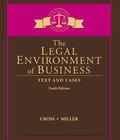
(a)
Case summary:The company D made a product CC. The companies C and D had one-third of the market share in the product CC and agreed to fix the price of the product. After a few years, person R became the president of D and decided to influence other competitors to rejoin the conspiracy. After an investigation by US Department of Justice, the court convicted R for conspiracy and for the violation of section 1 of the Sherman act.
To find: The justification for the enhancement of the punishment of R on the basis of his position as a supervisor or a manager.
(b)
Case summary: The company D made a product choline chloride. Both companies C and D had one-third of the market share in the product and agreed to fix the price of the product. The person R became the president of D and decided to influence other competitors to join the conspiracy. After an investigation by US Department of Justice, the court convicted the R for conspiracy and for the violation of Section 1 of the Sherman act.
To find: The unethicalness in the decision of R and other competitors.
Case summary: The company D made a product choline chloride. Both companies C and D had one-third of the market share in the product and agreed to fix the price of the product. The person R became the president of D and decided to influence other competitors to join the conspiracy. After an investigation by US Department of Justice, the court convicted the R for conspiracy and for the violation of Section 1 of the Sherman act.
To find: The way R might have behaved ethically.
Want to see the full answer?
Check out a sample textbook solution
Chapter 27 Solutions
EBK THE LEGAL ENVIRONMENT OF BUSINESS:
- What would be the reported book value of the trademark three years after purchase?arrow_forwardAnswerarrow_forwardDiscuss the accounting treatment for property and equipment impairment and the potential impact on the company's financial statements. What factors can trigger an impairment test? Answerarrow_forward
- Right Answerarrow_forwardWhat is the profit margin if the tax rate is 32 percent?arrow_forwardNova Flex Corp. had net fixed assets of $20,500 at the start of the year and $21,800 at the end. The company recorded $4,200 in depreciation and spent $9,000 on purchasing new fixed assets. How much in fixed assets did Nova Flex Corp. sell during the year?arrow_forward
 BUSN 11 Introduction to Business Student EditionBusinessISBN:9781337407137Author:KellyPublisher:Cengage Learning
BUSN 11 Introduction to Business Student EditionBusinessISBN:9781337407137Author:KellyPublisher:Cengage Learning Essentials of Business Communication (MindTap Cou...BusinessISBN:9781337386494Author:Mary Ellen Guffey, Dana LoewyPublisher:Cengage Learning
Essentials of Business Communication (MindTap Cou...BusinessISBN:9781337386494Author:Mary Ellen Guffey, Dana LoewyPublisher:Cengage Learning Accounting Information Systems (14th Edition)BusinessISBN:9780134474021Author:Marshall B. Romney, Paul J. SteinbartPublisher:PEARSON
Accounting Information Systems (14th Edition)BusinessISBN:9780134474021Author:Marshall B. Romney, Paul J. SteinbartPublisher:PEARSON
 International Business: Competing in the Global M...BusinessISBN:9781259929441Author:Charles W. L. Hill Dr, G. Tomas M. HultPublisher:McGraw-Hill Education
International Business: Competing in the Global M...BusinessISBN:9781259929441Author:Charles W. L. Hill Dr, G. Tomas M. HultPublisher:McGraw-Hill Education





